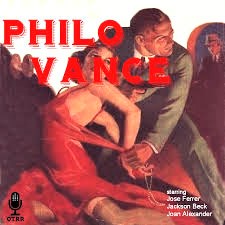
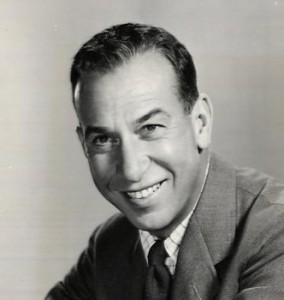 Philo Vance (1943-45, 1945, 1946-52) aired “The Case of Strange Music” on August 9, 1945. The number of total aired episodes is unknown due to the lack of information on the 1943-45 run, though a good estimate combining the other two runs comes close to 120. “The Case of Strange Music” is listed as the sixth of the thirteen 1945 summer replacement episodes, thus is one of the earliest in current circulation.
Philo Vance (1943-45, 1945, 1946-52) aired “The Case of Strange Music” on August 9, 1945. The number of total aired episodes is unknown due to the lack of information on the 1943-45 run, though a good estimate combining the other two runs comes close to 120. “The Case of Strange Music” is listed as the sixth of the thirteen 1945 summer replacement episodes, thus is one of the earliest in current circulation.
The character of detective Philo Vance was the brainchild of S. S. Van Dine (pseudonym of Willard Huntington Wright, 1887-1939). Wright would pen 12 Philo Vance novels between 1926 and 1939, the first of which was The Benson Murder Case (1926) and the last being The Winter Murder Case which he finished shortly before his death in April of 1939. Vance was very much in the mold of the “gentleman detective” or what would come to be known as the “soft-boiled” variety of detective. He has much in common with Sherlock Holmes and Nero Wolfe in that he was in possession of a giant intellect, though his arrogance and aloofness surpassed that of the former detectives and put many off. As Wright himself wrote of his character (via Van Dine) in The Benson Murder Case: “Vance was what many would call a dilettante, but the designation does him an injustice. He was a man of unusual culture and brilliance. An aristocrat by birth and instinct, he held himself severely aloof from the common world of men. In his manner there was an indefinable contempt for inferiority of all kinds. The great majority of those with whom he came in contact regarded him as a snob. Yet there was in his condescension and disdain no trace of spuriousness. His snobbishness was intellectual as well as social. He detested stupidity even more, I believe, than he did vulgarity or bad taste. I have heard him on several occasions quote Fouché’s famous line: C’est plus qu’un crime; c’est une faute. And he meant it literally.
“Vance was frankly a cynic, but he was rarely bitter; his was a flippant, Juvenalian cynicism. Perhaps he may best be described as a bored and supercilious, but highly conscious and penetrating, spectator of life. He was keenly interested in all human reactions; but it was the interest of the scientist, not the humanitarian.
“Vance’s knowledge of psychology was indeed uncanny. He was gifted with an instinctively accurate judgement of people, and his study and reading had coordinated and rationalized this gift to an amazing extent. He was well grounded in the academic principles of psychology, and all his courses at college had either centered about this subject or been subordinated to it…
“He had reconnoitered the whole field of cultural endeavor. He had courses in the history of religions, the Greek classics, biology, civics, and political economy, philosophy, anthropology, literature, theoretical, and experimental psychology, and ancient and modern languages. But it was, I think, his courses under Münsterberg and William James that interested him the most.”
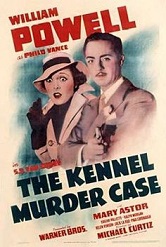 Unfortunately (or fortunately as is your preference), the radio and film portrayals of Vance toned down his aloof disdain for the common man and made him more likable for audiences. Speaking of the films, there were a dozen adapted from 1929 through 1940. There were a trio of later films made in 1947 but they had nothing to do with the novels and little relationship to the Vance character. Of the first five films (two in 1929, two in 1930, and the fifth in 1933) William Powell starred in four, while future Sherlock Holmes film star of the 1940s, Basil Rathbone, starred in the fourth (The Bishop Murder Case, 1930). The final Powell role as Vance came with 1933’s The Kennel Murder Case. Such was Powell’s popularity and connection with the movie-going audience that in 1934, barely a year later, he would co-star with Myrna Loy in the first of the classic films adapted from Dashiell Hammett’s The Thin Man detective novels and stories.
Unfortunately (or fortunately as is your preference), the radio and film portrayals of Vance toned down his aloof disdain for the common man and made him more likable for audiences. Speaking of the films, there were a dozen adapted from 1929 through 1940. There were a trio of later films made in 1947 but they had nothing to do with the novels and little relationship to the Vance character. Of the first five films (two in 1929, two in 1930, and the fifth in 1933) William Powell starred in four, while future Sherlock Holmes film star of the 1940s, Basil Rathbone, starred in the fourth (The Bishop Murder Case, 1930). The final Powell role as Vance came with 1933’s The Kennel Murder Case. Such was Powell’s popularity and connection with the movie-going audience that in 1934, barely a year later, he would co-star with Myrna Loy in the first of the classic films adapted from Dashiell Hammett’s The Thin Man detective novels and stories.
For the 1945 summer replacement series, native-born Puerto Rican actor (Tony {1947} and Oscar {1950} award winner, both for his portrayal of Cyrano de Bergerac) Jose Ferrer (photo top right, 1912-1992), would play Vance, and his portrayal is considered by critics and lovers of the series to be one of the best. “The Case of Strange Music” begins innocently enough while Vance and requisite lady friend visit a carninval, one of the more alluring exhibits being a wax museum. A dropped glove and a return to the museum to recover the glove leads to something one doesn’t usually find in a wax museum–a dead body–and the mystery is suitably kickstarted, but with a most unusual and unexpected resolution. Oh, yes, and the strange music of the title? Just another clue that makes sense in the characteristic fashion of a good Philo Vance mystery. See if you can ferret out its significance before Vance does.
In the real world, not only did this episode air on August 9, 1945 but the United States dropped the second of its atomic bombs on the Japanese city of Nagasaki on the same date, effectively ending the war in the Pacific. Strange music, indeed.
Play Time: 28:53
{After listening to this episode of Philo Vance, several of the neighborhood gang wanted to read more stories to challenge their own budding detective skills, yet there was one SF diehard among them who wanted his fix of SF. Planet Stories (1939-53) promised great adventure for the hot days of August 1945 and this issue provided its fill of monsters and damsels in distress. In 1945 Planet Stories was a quarterly. Crack Detective (1938-57), along with Thrilling Detective (1931-53) featured more action-oriented “hard-boiled” detective fare quite the opposite of that to be found in a Philo Vance novel or radio show, and were just the fast-paced, page-turning kinds of Good Guy vs. Bad Guy stories eagerly sought by young boys. 1945 found Crack Detective on a bi-monthly schedule, while Thrilling Detective was a monthly until its next issue, cover dated September 1945, at which time it cut back to a bi-monthly schedule.}
[Left: Planet Stories, Summer 1945 – Center: Crack Detective, July 1945 – Right: Thrilling Detective, Summer 1945]
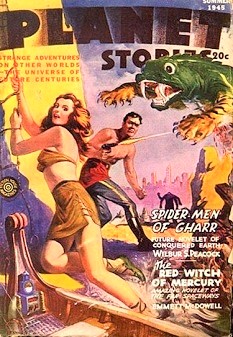
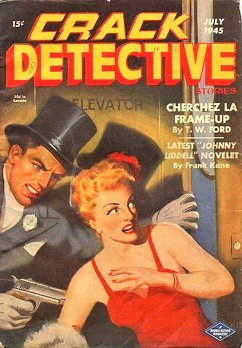
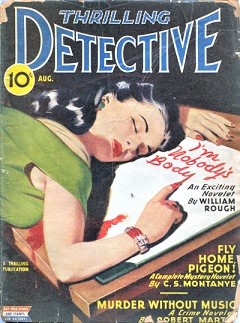
To view the entire list of weekly Old Time Radio episodes at Tangent Online, click here.